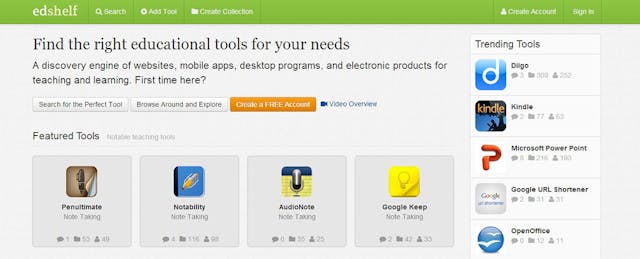The most valuable resources for any startup--after the founders and the team--are money and time. Edshelf, a startup that built an online directory of education apps and tools, has run out of both.
In a heartfelt blog post, CEO Mike Lee announced that edshelf will be closing shop on July 25:
“We weren’t able to build edshelf into a sustainable business and the costs of running our service have depleted the company’s and our personal savings. We have looked into everything we could to keep edshelf going, but unfortunately none of them worked out.”
Lee started edshelf in January 2012 to help educators find the most effective online tools at a time when the number of products was exploding. (He estimates that there are now over 180,000 education apps across the iTunes App Store and Google Play marketplace.)
Edshelf was to be the online destination where people find the tools that they need, based on reviews and filters that allow users to search by price, age, subject, platform and category. According to Lee, the website currently lists “a few thousand” 4,000 tools and has about 15,000 users (mostly from the IT department) across roughly 7,000 schools in 6,000 districts.
But the team of four struggled to find a revenue model. Lee believed that edshelf had to be free for its users but struggled to find a way to charge companies without sacrificing the integrity of its ratings platform.
“All we had charged so far was for advertisers to sponsor our newsletters,” says Lee. The team thought about charging companies for featured listings but quickly decided against going that route. It did not want money to influence app rankings or listings.
To keep the company running, Lee reached out to investors, foundations and banks--but to no avail. He also considered raising money from a crowdfunding platform. Other than the roughly $20,000 that the startup received from participating in the Imagine K12 incubator, it has been running on mostly the founders’ personal savings.
Like most edtech entrepreneurs, Lee started edshelf with the most altruistic of intentions. But he has learned that goodwill and a noble cause must co-exist with the realities--and costs--of running a business. “Schools tend to ask and want to see a business model, so that they can be secure that you won’t close up shop like we did,” Lee says.
“The most important thing for an edtech company is to make sure you’re building a product that has a way to sustain itself,” advises Lee. “In our case, we were building a platform business that took too much time to find a revenue model.”
Lee concedes the team spent too long testing features that users wanted but were not directly tied to revenue. “A lot of our teachers wanted to meet other members on edshelf to ask questions and socialize in a manner like Quora,” he shares. “We thought we could build our own but it took a lot longer than we thought. And when we released it not very many people took it up.”
“We did our best to follow the Lean Startup model, but sometimes we took way too long to test our assumptions,” Lee adds. Another feature in the pipeline--and one that might have been better tied to revenue--was a premium account for schools that offer a private, branded network where teachers can choose and share what tools could be used, along with private reviews.
Lee remains convinced that there is a need for services like edshelf. In a post published on his personal blog two days before the announcing edshelf’s closure, he firmly stated that when it comes to helping educators find the tools they need, “the answer is in aggregation and curation services.” Other edtech review directories include Graphite, Balefire Labs and YogiPlay and yes, EdSurge.
As part of the shutdown process, Lee will help edshelf users export their saved collections of tools as a bookmarks file. Afterwards, he “may just wipe the entire site clean.” Lee plans to spend more time with family and “recuperate” after this experience.
“I’m a big supporter of edtech, but there’s just too much of it out there,” Lee says. “Most [educators] have a hard time trying to wrap their heads around it all,” he adds.


